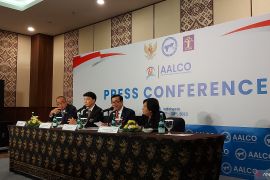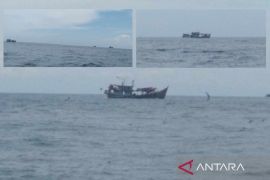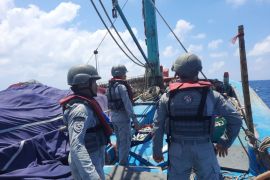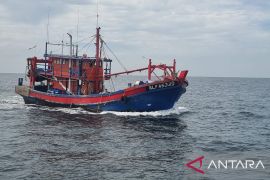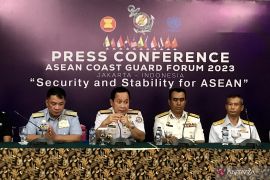"I have invited and talked with all ambassadors of the neighboring countries such as Thailand, Australia, and China, Susi said when visiting the University of Diponegoro (Undip) here on Monday.
She said the ambassadors of the neighboring countries were invited to discuss the government policy of sinking fishing vessels used in illegal fishing.
She said Indonesia, which has the worlds second longest coast after Canada,certainly has abundant sea natural wealth, but so has been allowed to be stolen by foreign fishermen.
The number of households of fishermen has declined over the past 10 years from 1.6 million to 800,000 in the country which is made up of 70 percent of sea territory.
"This means we begin to abandon sea fishing, which has been the profession of our forefathers," the minister said.
Many of our fishermen could no longer rely on fishing to support their life as their fishing ground have been depleted by foreign fishermen, she added.
"Therefore, we need to protect our resources. That is what I am doing," she said.
She said after hearing reasons and explanation, the ambassadors of neighboring countries agreed with the policy of sinking the vessels used in illegal fishing.
Even some of the neighboring countries asked Indonesia to hold joint patrol against illegal fishing, she said.
"The law allows sinking ships used for illegal fishing. I have issued ministerial regulations based on the law. This has become a national consensus that has to be enforced," she added.
Around 1,300 licenses issued earlier by the marine and fisheries ministry are reviewed and operation of former foreign fishing vessels is banned and various other policies followed, she added.
"The result is Indonesias fisheries sector has grown 8.96 percent when other countries such as Thailand, the Philippines recorded a decline in their fisheries sector. Fishery exploitation declined 30-35 percent," she pointed out
In two years, the government already sank around 200 fishing vessels used in illegal fishing .
The policy has triggered controversy. Those against it arguing that ships could confiscated by the state to be given as a grant to fishermen.
However, Mafia practice has been rife in the fisheries sector that would not help reduce illegal fishing.
Auctions held by court of fishing vessels had resulted in the vessels falling back on the hand of the original owners.
According to former Director General of Supervision of Marine and Fisheries Resources Aji Sularso, the original owners of ships cooperated with Indonesian Mafia allowing the foreign fishermen to reclaim their vessels by paying only half of the price .
The Mafia involving prosecutors and court officials arranged so that local fishing companies had no chance of winning an auction.
After securing back their vessels the fishermen resumed their illegal operations in Indonesian waters.
The law, therefore, was not effective in reducing illegal operations by foreign fishermen in Indonesian waters.
The one to suffer loss in the process of auction was the state as the money going to the state treasury from the result of the auction was not enough to cover the cost of catching the vessels, keeping the vessel at berth and feeding the crew,etc.
That was the reason that the government took a drastic measure by sinking the vessels that they could no longer be used for illegal operation, Aji said.
The sinking policy is effective . Based on satellite data, there was almost no more fishing vessels marauding in Indonesian waters.
The government said illegal, unreported and unregulated fishing caused a loss of around Rp300 trillion a year.(*)
Editor: Heru Purwanto
Copyright © ANTARA 2016
